Is SEO Worth It for Small Business? [A 2025 Guide]

Natalia Toth
As a small business owner, you're always on the lookout for ways to grow revenue.
When researching what marketing channels work best for small enterprises, you'll find numerous debates about the role of SEO in your growth. Some entrepreneurs swear by it, while others are skeptical.
Questions like these can cross your mind:
- Is it not better to invest in paid ads instead?
- Should I handle SEO myself or hire someone?
- How do I know if the ROI is there?
- Is SEO worth my time and energy at all?
In this post, let’s try to answer all these questions.
What is SEO?
SEO, or "search engine optimization," is about making your website more visible on search engines like Google and Bing.
It involves optimizing your site so it ranks higher when people search for products you sell, services you offer, or topics you're an expert in. The higher your site ranks, the more likely users are to click on it: the site that appears #1 in search results gets nearly 30% of all clicks.
The ultimate goal of SEO is to attract visitors who might become your customers. A well-thought-out SEO strategy drives the right people to your site at the right time.
How does SEO benefit small businesses?
61% of marketers say improving SEO is their top inbound marketing priority.
But as you browse ‘Is SEO worth it for small business?’ on online forums, you’ll probably get confused by what people say.
‘This shouldn’t even be a real question - the answer is always yes’
‘SEO IS worth it, but you need to be consistent’
‘it’s definitely worth it for the long term’
‘‘I’ve spent thousands on SEO without seeing significant results’
"Investing in SEO didn’t pay off for us’
‘It's 2024... SEO is dead.’
Everyone has different experiences. So whom should you listen to?
Let’s see the reasons in favor of SEO for your small business.
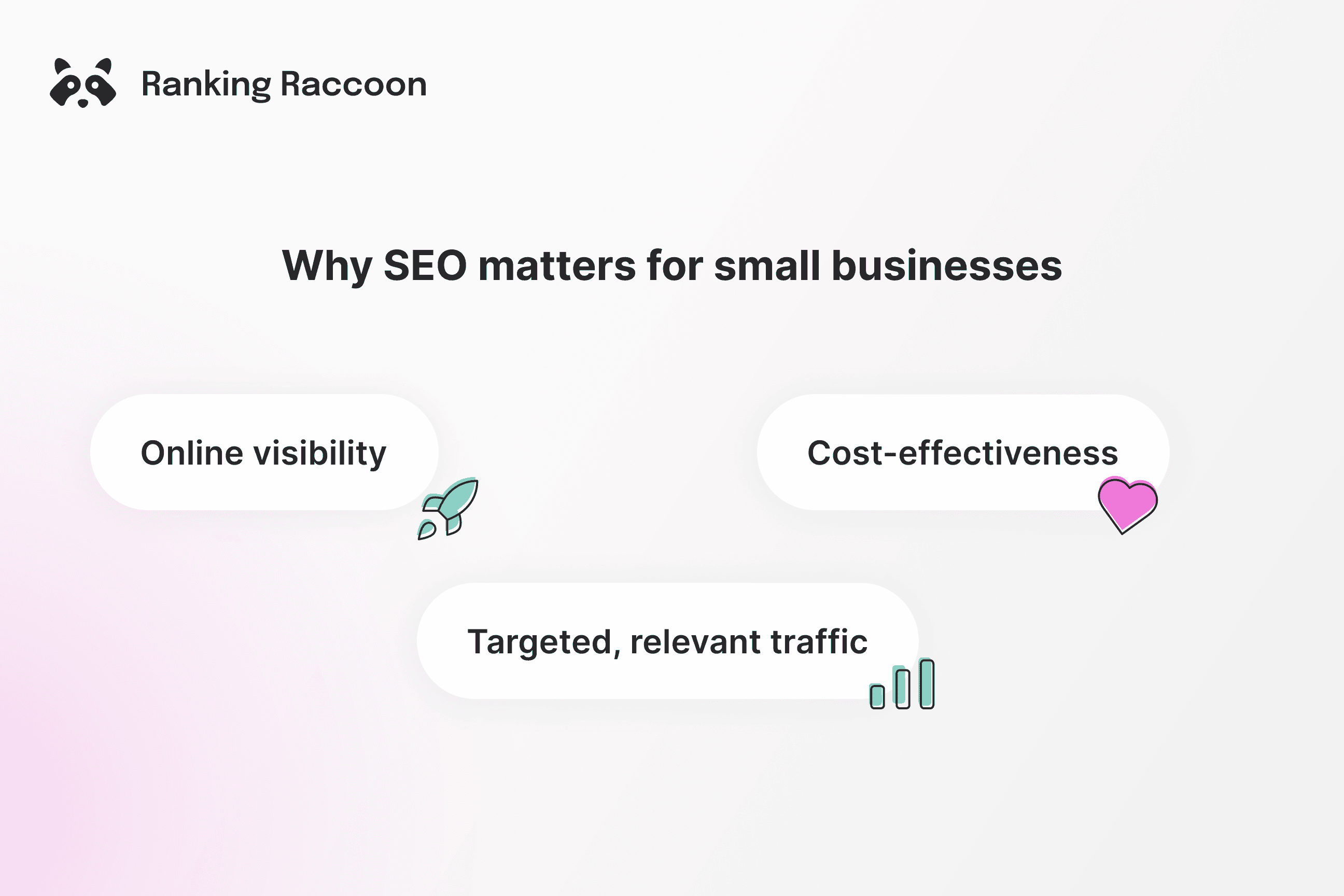
SEO puts you in front of your audience
The main rationale for SEO is to help potential customers find you on the web.
Organic search remains the top source of website traffic, driving a whopping 53% of all visitors.
Even more astonishingly, 75% of people never scroll past the first page of search results. So, if you're not on that first page, you're virtually invisible online.
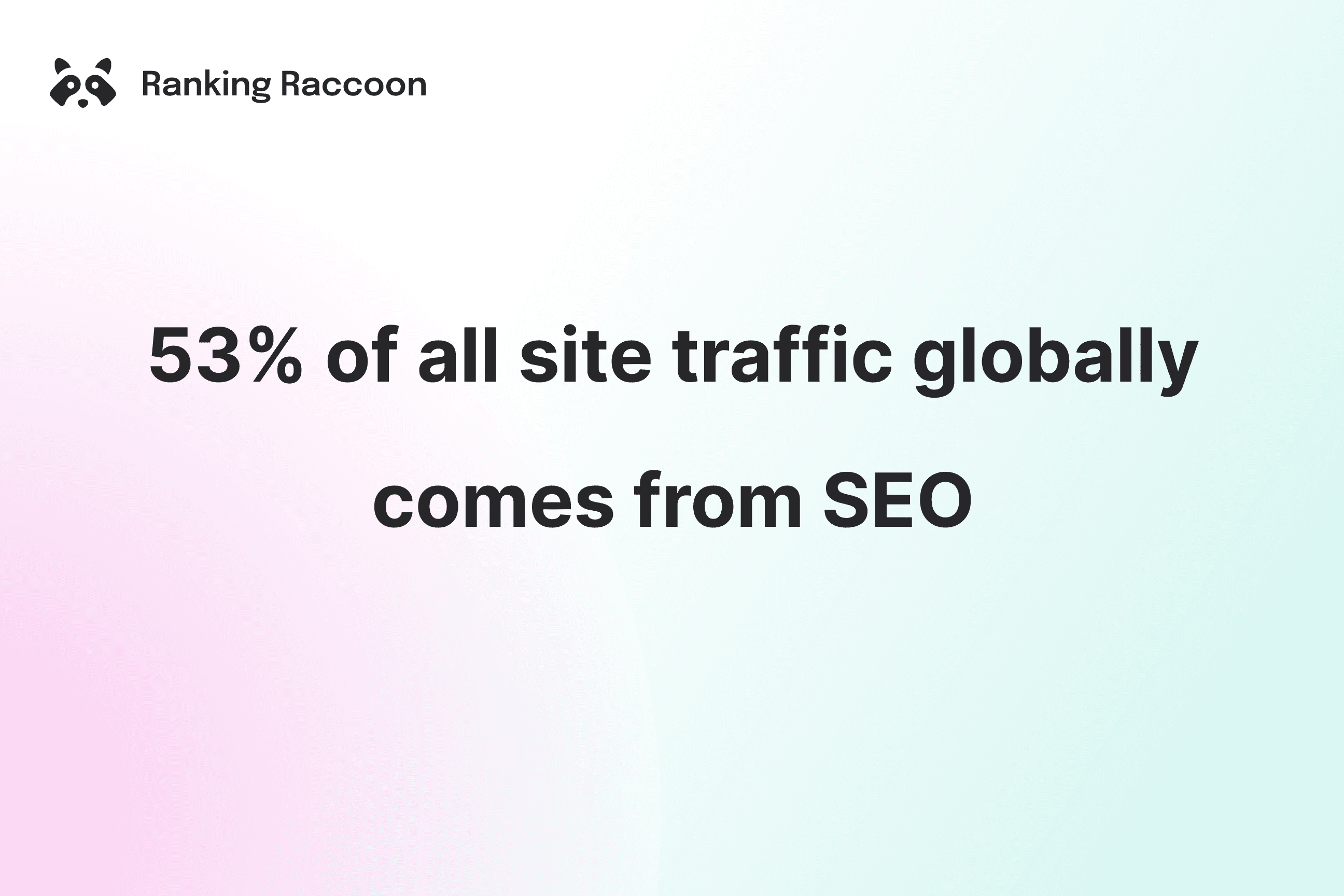
SEO is more cost-effective than paid ads
Are you wondering if paid ads are a better investment to attract customers? They seem an appealing solution to generate site traffic quickly.
But in the long term, SEO is a smarter option compared to paid ads, which are increasingly pricey. Let’s turn to some stats:
- Businesses can pay $9,000-$10,000 per month for a competitive paid search campaign, while SEO services typically range from $750 to $2,000 per month (Fog Digital).
- On average, businesses see a return of $9.10 for every $1 spent on SEO (FirstPageSage). This is a strikingly higher ROI than what PPC (return of $1.55 on every $1 spent), LinkedIn Ads, or Facebook Ads (return of $2.30 and $1.80, respectively) can offer. That makes SEO a viable marketing channel for small budgets.
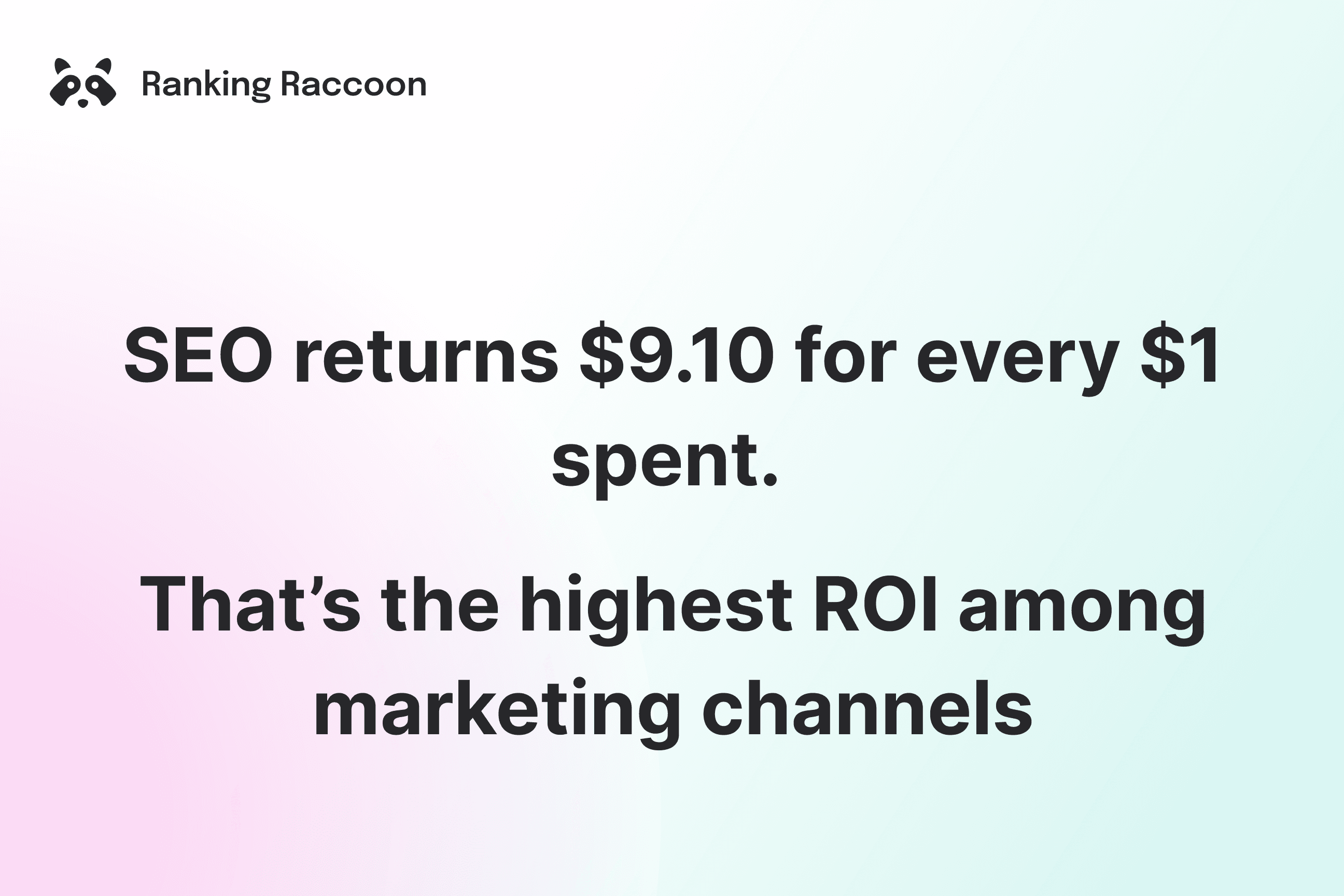
- Moreover, 70-80% of users focus solely on organic results, skipping the sponsored results entirely.
- Click-through rates on Google paid search ads are only about 2%. At the same time, the site that ranks #1 organically - although located under sponsored results - boasts an average CTR of 31.7%. That’s nearly 16x higher!
In the long run, SEO provides a better ROI. Sponsored ads are only displayed on the top as long as you pay for them. Once your campaign has ended, they disappear.
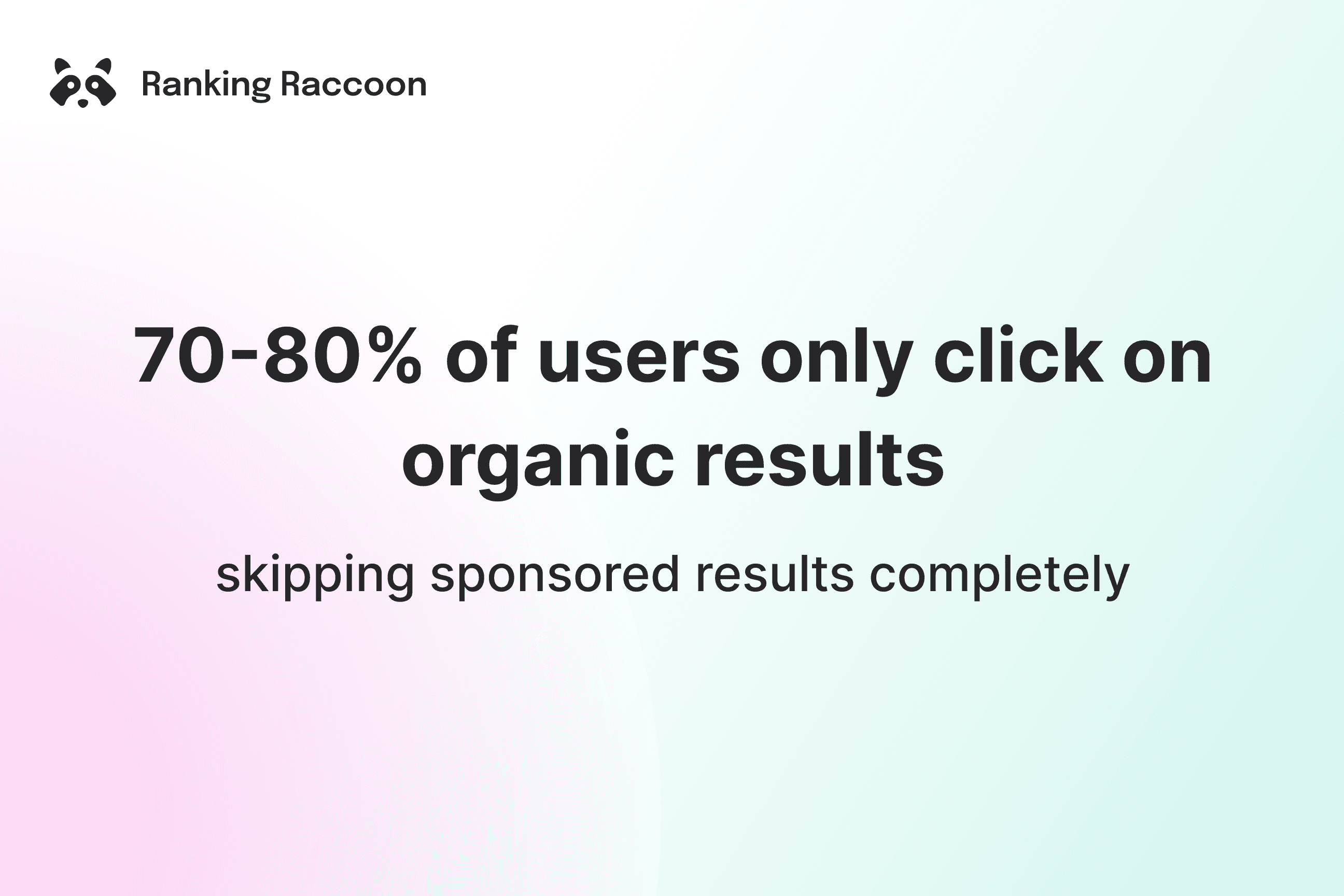
Your SEO content gets discovered naturally months and years after it was published. And unlike in the paid ads model, organic clicks are essentially free, so you also save funds.
'Since introducing SEO into our business for the first time in 2022 we’ve seen a huge impact on inbound leads coming from organic sources. As the months go by we’re becoming less reliant on paid media and we’ve also found that the leads we’re getting in organically are often more ready to buy, which is exactly what we set out to achieve.'
Hannah Lydford
SEO & Content Manager at B2B lead generation specialists, Headley Media
SEO attracts targeted traffic
SEO targets people who are actively searching for your products or services, meaning they're more likely to convert.
That’s particularly true for industries where trust and prestige matter the most for clients. According to FirstPageSage, in Financial Services, SEO shows a 7.3x higher conversion rate than PPC does. For Real Estate, Medical Devices, and Legal, the gap is 3.4-3.5x in favor of SEO.
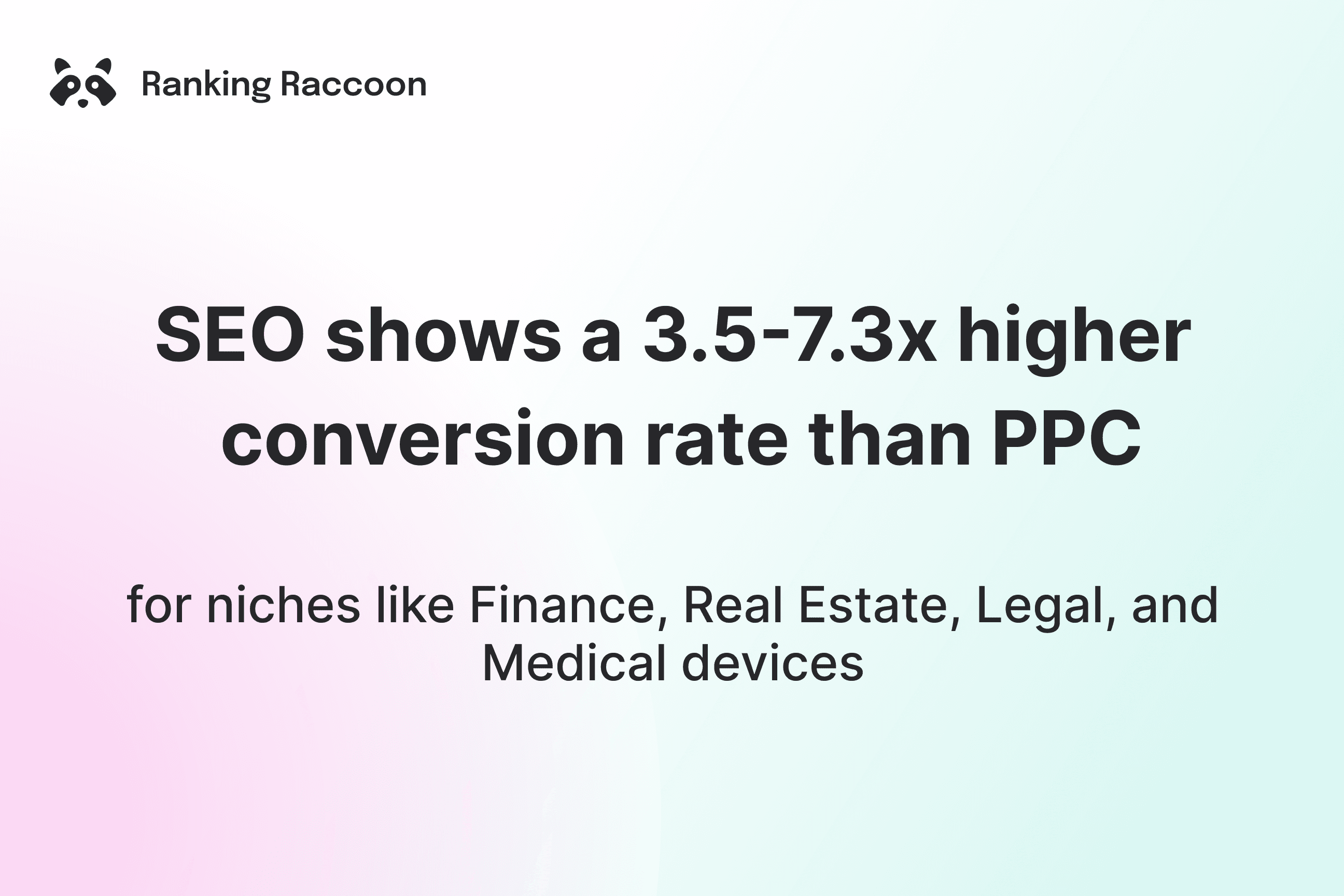
SEO drawbacks you should be ready for
Like any marketing channel, SEO has its flaws. Let’s look at what you might face if you get serious about your SEO strategy.
SEO is for the patient ones
SEO is not a quick fix; it often takes 6-12 to see significant results. This can be disappointing if you yearn for immediate returns on your marketing investments.
To mitigate risks, create a long-term SEO strategy and turn on other marketing channels like paid ads or direct sales that will drive immediate traffic while your SEO efforts gain traction.
SEO is for those not afraid of competition
If you’re in a lucrative niche, competing against established companies with large SEO budgets can be daunting.
But don’t get disheartened! Focus on niche markets or local SEO. Do keyword research and start by targeting long-hanging fruits - words with relatively high Search Volume (SV) and low Keyword Difficulty (KD). And with long-tail keywords and local search terms, you can carve out a space in the SERPs where competition is less intense.
SEO is for those ready to face algorithm changes
The Google algorithm releases another core update every few months, and each time, thousands of sites get affected - they lose domain authority (DA) or traffic overnight. What works today might not be effective tomorrow.
Subscribe to some worthy SEO newsletters like Search Engine Journal to stay informed about the latest trends. Using a mix of SEO strategies can also reduce the impact of algorithm updates.
SEO impact can be hard to measure
We’ll be fair: when it comes to results analysis, paid ads are much more transparent. Measuring the ROI for SEO is harder because you need to track various metrics over months and years. What’s more, it’s unclear how to attribute sales or conversions directly to SEO efforts.
Use analytics tools to track SEO metrics like organic traffic, keyword rankings, and conversion rates. Establish clear goals and KPIs to measure progress, and regularly review these metrics to adjust strategies as needed.
SEO for international vs. local small businesses
Whether your small business focuses on a local community or aims for a global audience, SEO can be your helping hand. Let's break down the difference between SEO for an SMB with global ambitions and a purely local business.
SEO for globally oriented small businesses
If you’re selling to customers across the globe, there are a few key aspects of SEO you need to consider.
International keyword research
Think globally! You need to find out what keywords people are using in different countries, as these can differ a lot. Tools like Google Keyword Planner, SEMrush, or Ubersuggest are great for this.
Let’s say you’re a tech startup in the US. You might find that the keyword "cloud storage solutions" is popular domestically. If you also target the German market, you could see that the local version, "Cloud-Speicherlösungen", is more commonly searched.
'Although our business is an SME, we work on a global scale and our main target audience is the US. By creating an SEO strategy we’ve been able to target our desired audiences through keyword research and creating content that addresses the pain points of our audiences across different regions. We’re seeing organic traffic from a whole host of countries but the US is our fastest growing region.'
Hannah Lydford
SEO & Content Manager at B2B lead generation specialists, Headley Media
Multilingual and multiregional SEO
You need to speak your audience’s language. Or at least, your website needs to.
If you want to connect with customers in Spain, your website needs to have a Spanish version. Use hreflang tags to help search engines show the right language version to the right people. You might also use country-specific domains like `.co.uk` or subdirectories like `/fr/` for France. Websites that use hreflang tags for international SEO see +20% organic traffic.
For example, Airbnb has different versions of their site tailored to each country, with content translated and localized for specific regions, like airbnb.fr for France and airbnb.co.uk for the UK.
Technical SEO
A 1-second delay in site speed drops conversions by 7%, so make sure your site loads quickly wherever users are. A Content Delivery Network (CDN) can help speed things up globally. Structured data and schema markup also help Google understand your content better, no matter the language.
Global link-building
Backlinks are links from other websites to yours, and they're among the top three ranking factors.
Links from real, fitting sites in your niche show search engines that your content is valuable. To visitors, links signal that your site can be useful to them and worth checking out.
If you source clients globally, get links from reputable international sites. Guest blogging, digital PR, podcasts, and partnerships help you build a robust backlink profile.
Say, if you're a SaaS company, you can write testimonials and reviews for other SaaS tools in the space, get listed in software tool directories, or host a joint event with a technology partner. Check out our blog post for proven ways to get backlinks for SaaS websites.
If you’re a global fashion brand, you might collaborate with fashion bloggers and fashion-focused sites worldwide to generate links from diverse locations.
Although 65% of marketers name link-building as the toughest of their SEO tasks, there are worthy, budget-friendly link-building tools that simplify the job for you. For example, Ranking Raccoon is an affordable, spam-free link-building platform that helps small businesses build quality backlinks faster and foster long-term partnerships.
Localized Content
As a global company, it’s a good call to tailor your content to fit local cultures. It’s not just about translating text – think about local preferences, holidays, and trends.
Example: A small bakery chain expanding into France might create localized SEO content by highlighting traditional French pastries like croissants and éclairs on their site or featuring blog posts about French baking ingredients to engage the local audience.
SEO for Local Businesses
Did you know that 78% of mobile local searches result in an offline purchase, and 1 in 5 consumers do online searches daily to find local businesses near them? That’s the power of local SEO you can’t neglect!
Here are the key aspects of your local SEO strategy.
Local keyword research
Focus on keywords that include your location, like "best coffee shop in Austin." Tools like Google Trends can help find popular local search terms and even how their popularity fluctuates from month to month.
To illustrate this, a local bakery in Boston can target keywords like "best Boston bakery" or "custom cakes Boston" to attract local search traffic.
Google Business Profile
If you want to be discovered by people in your area, setting up a free Google Business account with accurate NAP (Name, Address, Phone number) info is a no-brainer. Many local business founders will say that customer reviews are the #1 factor for your visibility and growth.
For instance, if you manage a local plumbing service and create your Google Business profile, you’ll appear in Google results whenever someone types in "plumber near me."
Local link-building
The link-building strategy for a local brand will be different from a globally oriented product.
You’ll want to prioritize backlinks from local news sites and blogs. Being active in community events and sponsoring local organizations can also help.
Example: A local restaurant might sponsor a community event or charity run, earning backlinks from local news sites covering the event.
Read more: Backlink Exchange: Good or Evil? [A Guide for 2025]
On-page SEO for local search
Include your location in your site’s meta tags, headers, and content. Use schema markup to help search engines understand your business's location and services.
Example: A dentist’s website in Denver might use meta tags like "Denver family dentist" and include structured data to highlight their location and services.
In short, if you’re aiming to reach customers around the world, you need a broader, more diversified SEO strategy, while local SEO optimizes for your immediate community. Both strategies can yield fantastic results when executed correctly.
Is paying someone to do SEO worth it?
So, you are convinced that SEO should be a part of your marketing mix. Now, should you tackle SEO yourself or hire an external pro? Let's weigh the options.
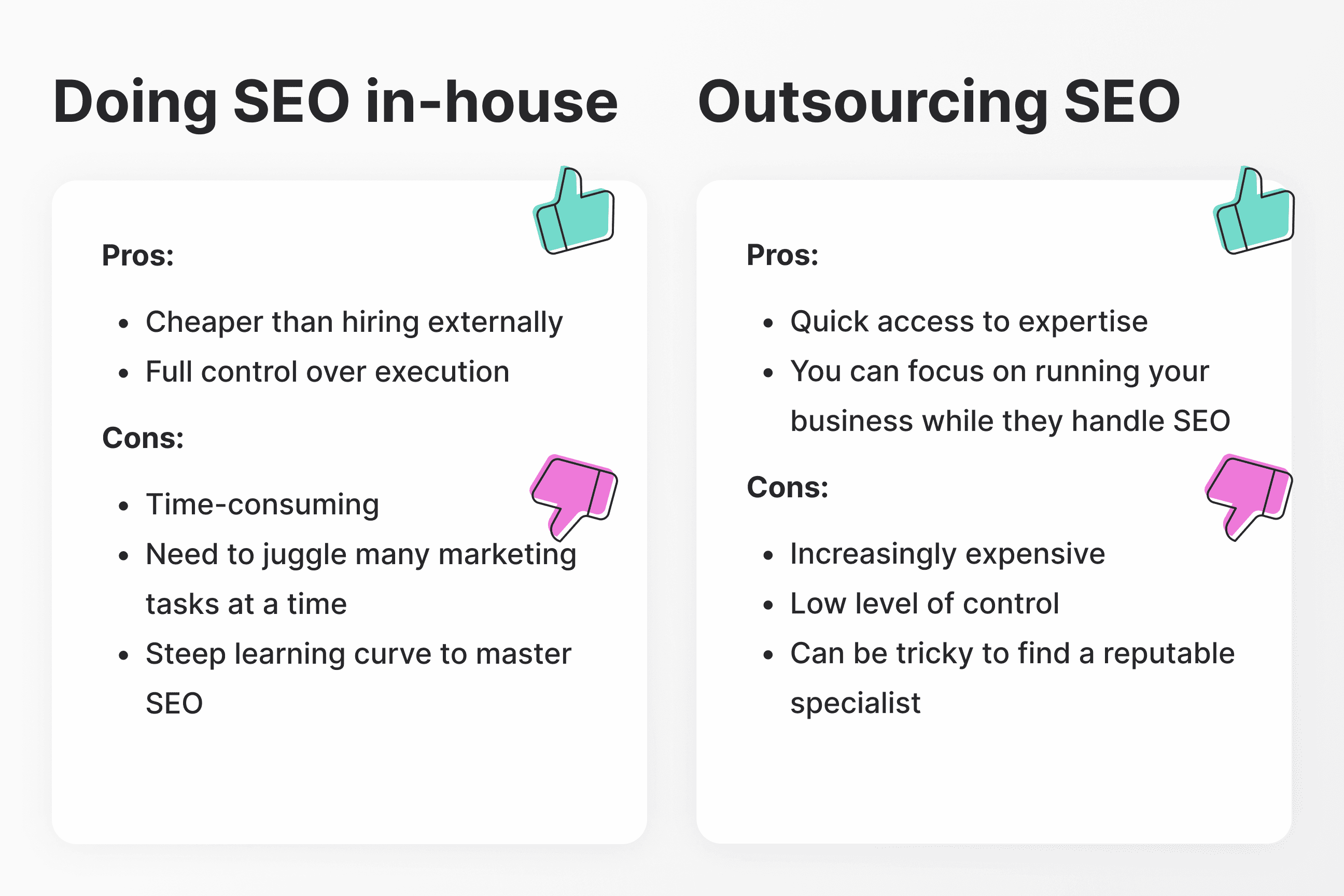
Pros of doing SEO in-house:
- Cheaper: Doing it yourself saves money upfront.
- Control: You have full control over your SEO strategy.
Cons of doing SEO in-house:
- Time-consuming: SEO takes a lot of time and effort.
- Steep learning curve: There’s a lot to learn, and mistakes can be costly.
Pros of outsourcing SEO services:
- Expertise: Professionals know the latest trends and best practices.
- Time-saving: You can focus on running your business while they handle SEO.
Cons of outsourcing SEO services:
- Cost: External SEO services can be expensive.
- Trust: You need to find a reputable specialist to avoid scams or time waste.
When to do SEO in-house and when to outsource?
How to decide? Consider your business's resources and goals.
You can opt for SEO in-house if:
- You have a dedicated marketing team with SEO expertise.
- Your budget is limited, and you can afford the long-term costs of training and tools.
- You need full control over your SEO strategies and execution.
You can opt for outsourcing SEO If:
- You lack internal SEO expertise and resources.
- You need to scale quickly with a well-rounded strategy.
- You want access to advanced tools and technology bundled with services.
- Your team is stretched thin and cannot keep up with constant SEO changes.
If you decide to outsource SEO, here are a few tips for hiring the right experts:
- Search for professionals who have experience with your specific niche. Educating the professional on the ins and outs of your industry can cost a lot of time.
- Ask for case studies, exact numbers, and ROI calculations
- Trustworthy professionals would offer a free first consultation
- Beware if someone offers you a 100% guarantee
- Similarly, avoid whoever promises you the #1 position in search results in a few days
How much can I expect to pay for SEO?
Costs can vary widely, but here’s a general breakdown of what you can expect:
- 32% of small businesses spend between $1,000 and $3,000 per month on SEO services. The exact amount depends on how competitive your niche is and what specific services you need.
- If you prefer to go the hourly route, expect to pay between $100 and $250 per hour for SEO experts.
- For specific projects, like a site audit or keyword research, costs can range from $1,000 to $5,000.
- To keep your costs to a minimum, check out our list of the best affordable SEO tools for small business. See our guide on how to get backlinks for free, too.
How do I know if the ROI is here?
Whether you manage SEO in-house or outsource it, you want to know if your SEO game brings fruit.
It’s notoriously hard to measure the direct impact that SEO has on your sales. Still, you can gauge if your SEO efforts are paying off. Keep an eye on these key metrics:
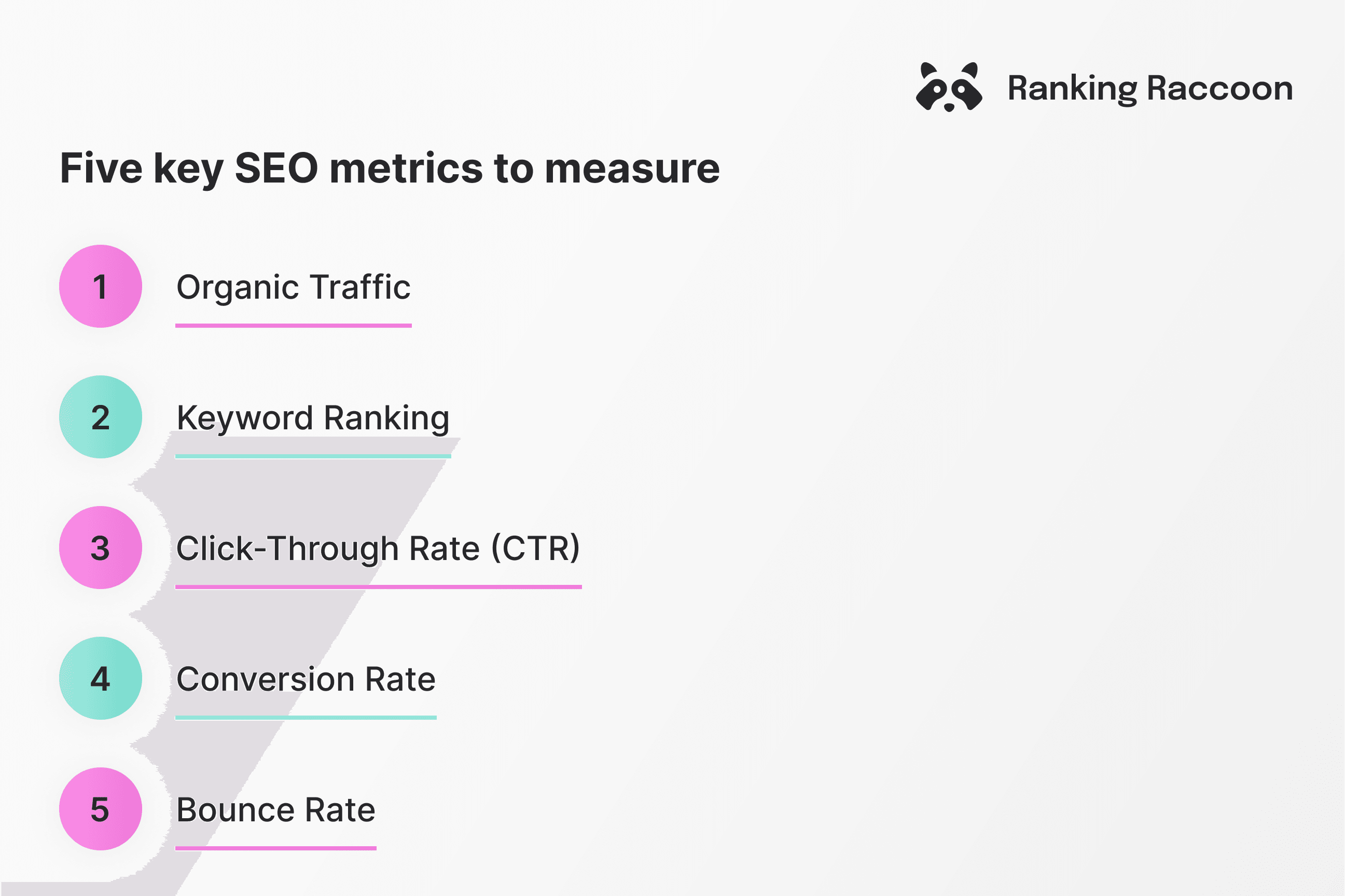
1. Organic Traffic: In Google Analytics (GA4) or a similar tool, check the number of unique first-time visitors and the overall traffic arriving from search engines. Go to Reports -> Generate leads -> User Acquisition and/or Traffic Acquisition -> Check out the figures for the ‘Organic Search’ channel group.
2. Keyword Rankings: In Ahrefs, Semrush, or a similar platform, you can monitor where your site appears in search for target keywords. Higher rankings generally lead to more traffic.
3. Click-Through Rate (CTR): This shows how compelling meta tags and descriptions for your content are on search engines. You will see the CTR in the Search Results tab in your Google Search Console account.
4. Conversion Rate: In GA4 again, track the percentage of site visitors who perform Key Events, or desired actions (e.g., signing up or making a purchase). This shows the quality of traffic you're attracting.
5. Bounce Rate: The percentage of visitors who leave your site after viewing only one page, it's available in GA4. Generally, a lower bounce rate suggests better user engagement - and the higher chance to convert users to buyers.
Read more: How to Measure Link-Building ROI with GA4: A 5-Step Guide
SEO wins: real-life case studies
Enough with theory! Let’s take a look at some real examples of small businesses that nailed SEO right and thrived.
Case study #1: Wild Alaskan Company
Wild Alaskan Company, founded in 2017, delivers wild-caught, sustainable seafood across the United States.
Once a tiny family business, they got serious about SEO by crafting content packed with suited keywords. In 2018, they rolled out a blog with seafood recipes, guides on fish species, and health-related articles, focusing on specific long-tail, high-intent search queries such as ‘how to cook frozen fish’. The company didn’t forget about internal linking either, suggesting related recipes and directing recipe readers to conversion pages where they could claim a $25 discount on their first order.
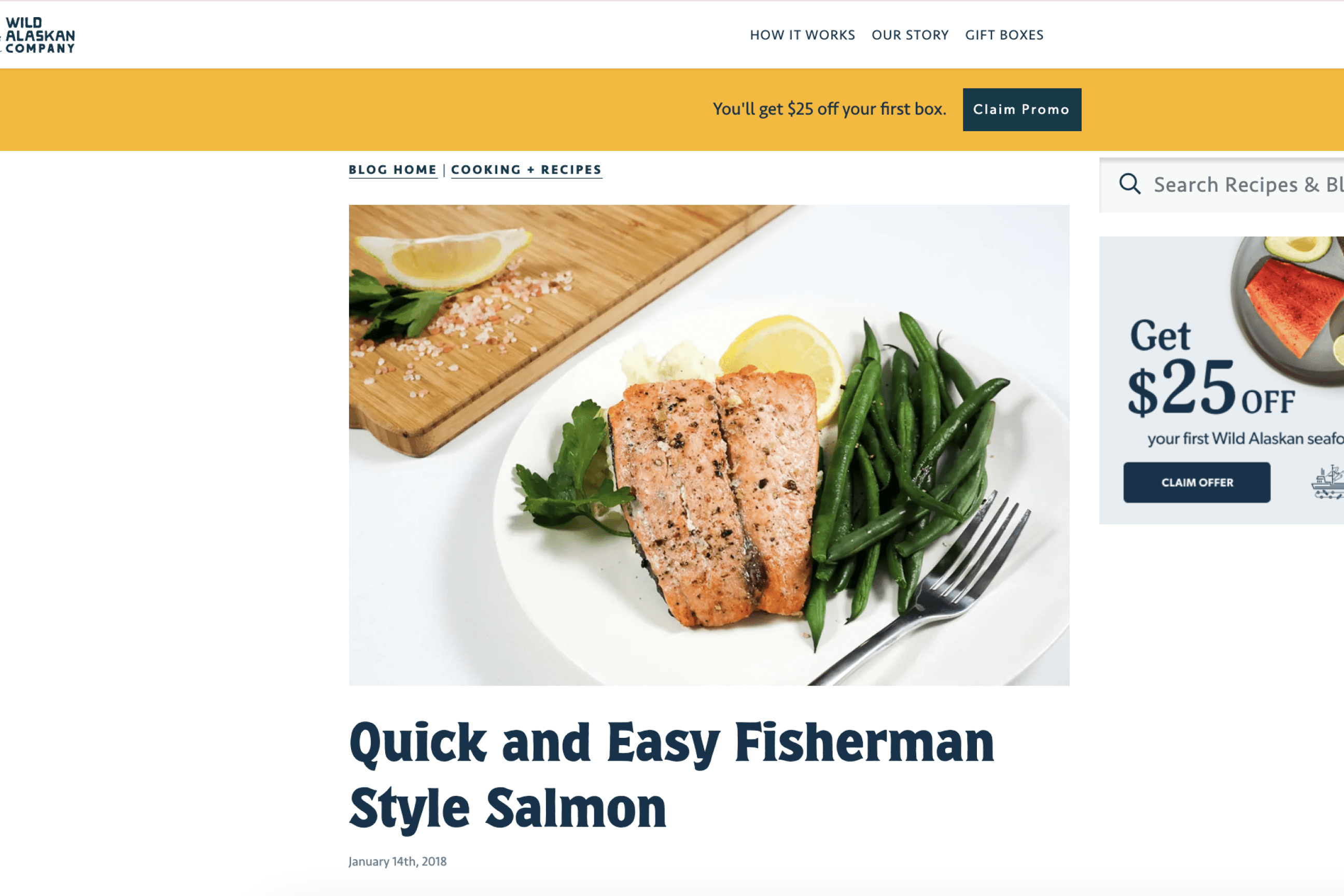
And of course, over time, Wild Alaskan Company secured powerful backlinks from top-grade sites - including Forbes, Hubspot, and even a review article on Business Insider.
Nowadays, the website ranks #1 for many competitive keywords in their niches, such as ‘prawns’, ‘undercooked salmon’, and ‘coho salmon recipe’.
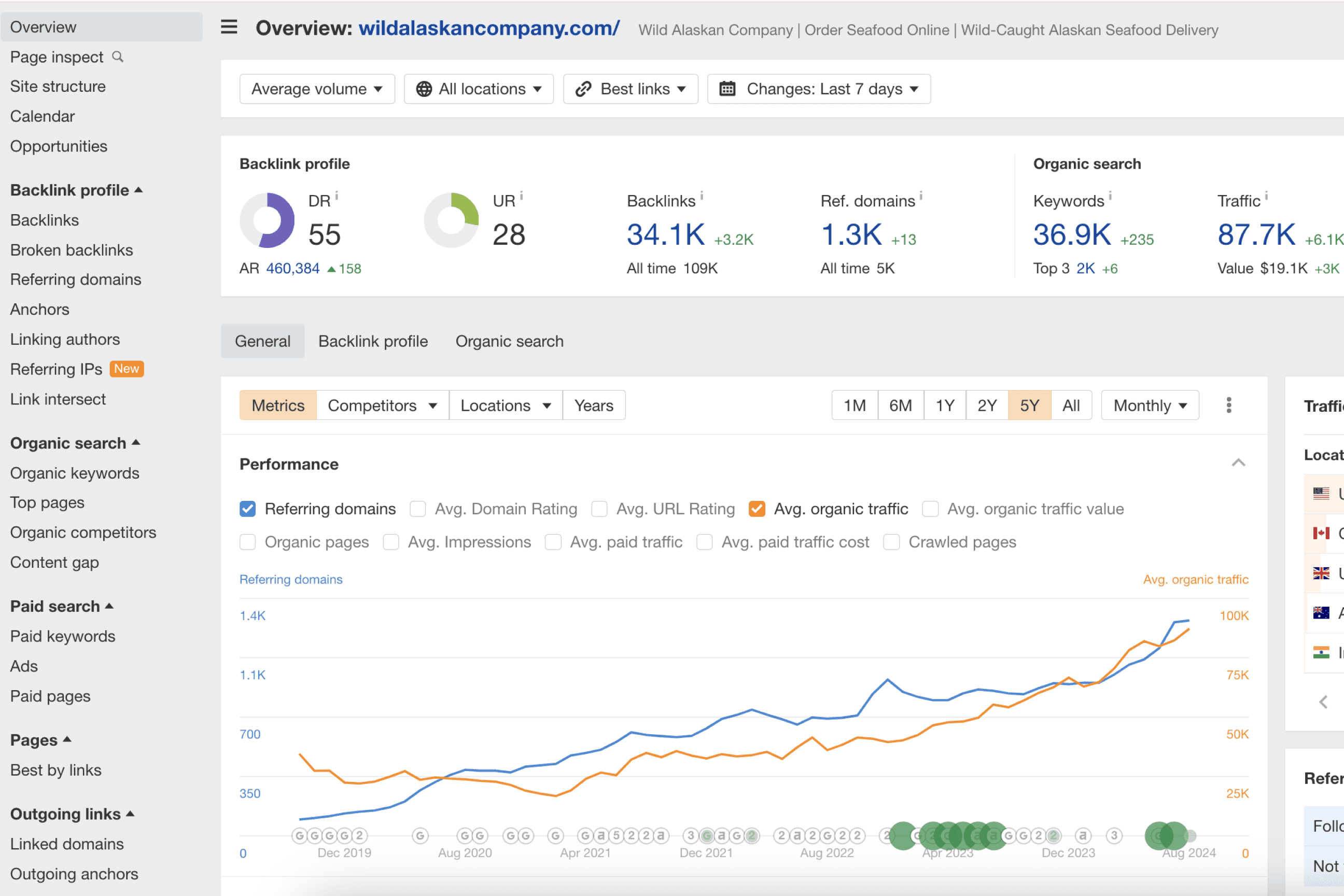
Case study #2: Bumblebee Linens
Bumblebee Linens, a retailer of exquisite linens, was launched in 2007 in California.

The retailer leveled up its SEO game by fine-tuning product descriptions and posting to-the-point blog content. They focused on keywords related to home textiles, care tips, and gift ideas for various occasions. Each gift suggestion links to a category page where visitors can browse and order items right away. Last but not least, Bumblebee Linens received quite a few powerful backlinks from authoritative sites in the e-commerce niche: Klaviyo, Databox, Retailmenot, and others.
All combined, this improved their search engine rankings, driving more traffic to the site. Today, the Bumblebee Linens site ranks top 5 in Google for such queries as ‘best wedding gift for bride’, ‘15 year anniversary’, and ‘personalized handkerchief’. Their articles on gift ideas are the most popular ones, attracting hundreds of high-intent users each month.
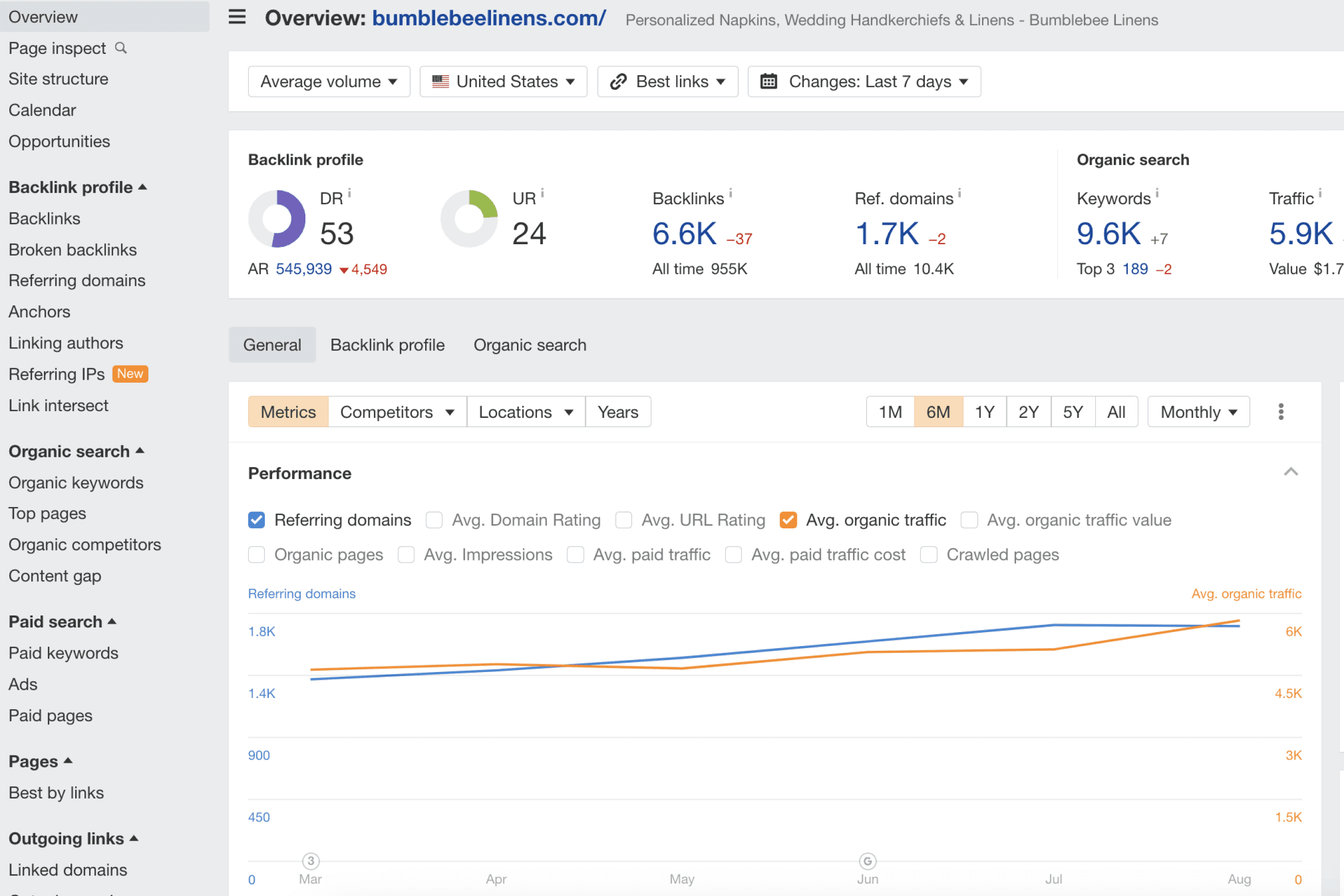
To sum it up
So, is SEO worth it for your small business in 2024?
Absolutely! Whether your audience is strictly local or international, whether you do SEO in-house or outsource it to an expert, SEO is a smart, cost-effective way to boost your online presence, attract targeted traffic, and eventually get a much higher ROI than paid channels can offer.
While it does take time and effort, the long-term benefits of being easily found by your ideal customers make it a no-brainer for small businesses looking to grow.

Natalia Toth
Marketing Manager